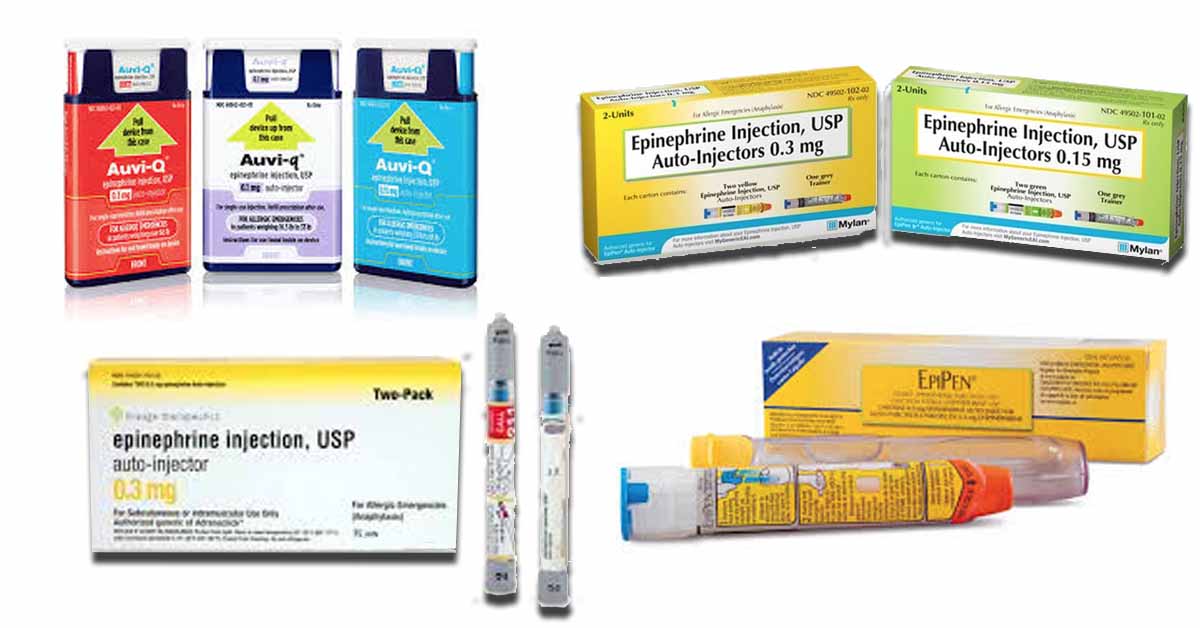Study from The Journal of Allergy and Clinical Immunology: In Practice shows majority of epinephrine auto-injectors retained over 90% concentration of epinephrine years after expiration dates, regardless of the manufacturer.
New research published in The Journal of Allergy and Clinical Immunology: In Practice (JACI: In Practice) demonstrates that epinephrine auto-injectors (EAIs) meet potency requirements set by the Food and Drug Administration (FDA) years after the labeled expiration date. This study adds to a growing body of research that indicates auto-injector expiration dates are currently too short and could be extended.
Multiple EAI brands including EpiPen® and its authorized generic, Auvi-Q® and the authorized generic of Adrenaclick® were collected from volunteers. The auto-injectors tested ranged from one to 168 months past their labeled expiration date.
Of the 46 EAIs studied, approximately 80% (37 EAIs) retained more than 90% of their epinephrine, the potency benchmark required by the FDA. At least one auto-injector from each manufacturer was represented among those 37 EAIs. Overall only nine of the expired auto-injectors failed to meet the FDA requirement.
“With most of the expired EAIs retaining a high enough percentage of epinephrine to meet FDA standards, we’re able to question current expiration dates on this life-saving medication,” said first author Lynn Kassel, PharmD, BCPS, Assistant Professor of Clinical Sciences at Drake University College of Pharmacy and Health Sciences. “Extending these expiration dates could help patients overcome financial barriers when it comes to obtaining auto-injectors, and may have an impact on the current shortage of epinephrine auto-injectors.”
Epinephrine concentrations from the donated EAIs were assessed via reversed-phase high-performance liquid chromatography (RP-HPLC) in the laboratory of Abebe Mengesha, PhD, Associate Professor of Pharmaceutical Sciences, also at Drake University College of Pharmacy and Health Sciences. EAIs were injected directly into the HPLC vials, by student pharmacist Caroline Jones, where pressure was maintained for 10 seconds to simulate an injection. The vials were analyzed immediately.
The results showed that EAIs up to six months past the expiration date retained 100% of the drug, with auto-injectors one year after the expiration date demonstrating 95% drug content or better. All of the EAIs analyzed up to 30 months beyond the labeled expiration date retained at least 90% of the drug content.
“According to these results,” Dr. Kassel said, “the current expiration dates of EAIs are too short, as the concentrations we saw indicate the devices may still be viable years after the expiration dates. These findings are consistent with previously published data on the longevity of epinephrine in auto-injectors.”
The short shelf-life of EAIs is a large burden for patients, especially with the sharp increase in auto-injector prices and the shortage of epinephrine in recent years. By gaining a better understanding of when epinephrine concentration falls below 90% in an auto-injector, more accurate expiration dates can be determined to extend the shelf-life of EAIs.
Despite this research, patients should always discuss their medications with a qualified medical professional. “We are not necessarily advocating for use of an expired medication; however, some patients may need to rely on these while drug shortages and cost of medications continue to make new auto-injectors unattainable,” Dr. Kassel added. “What we do hope is this growing body of evidence will eventually lead to more accurate expiration dates for auto-injectors.”
You can learn more about anaphylaxis at the AAAAI website, aaaai.org.
The American Academy of Allergy, Asthma & Immunology (AAAAI) represents allergists, asthma specialists, clinical immunologists, allied health professionals and others with a special interest in the research and treatment of allergic and immunologic diseases. Established in 1943, the AAAAI has nearly 7,000 members in the United States, Canada and 72 other countries. The AAAAI’s Find an Allergist/Immunologist service is a trusted resource to help you find a specialist close to home.





